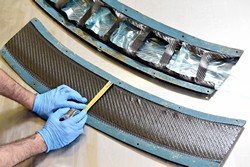Increasing carbon fibre use in cars
In addition to being lightweight for fuel efficiency, high-performance composite materials for the transport sector should have the potential to be used in fast production processes. Currently, production volumes tend to be limited to a few hundred or a few thousand units per year for aerospace or sports car applications. The project HIVOCOMP (Advanced materials enabling high-volume road transport applications of lightweight structural composite parts) changed that by developing two new high-volume materials for 'Carbon fibre-reinforced plastic' (CFRP) parts for cars and suitcases. The first system developed involved advanced 'polyurethane' (PU) thermoset matrix materials that showed improved mechanical performance and reduced cycle times when compared with the most commonly used epoxy matrix. Replacing this conventional matrix system with PU also enabled fast curing to be combined with high toughness and a high glass transition temperature. Nanoparticles added to PU resulted in further improvements in the processing – reduced resin viscosity and reaction kinetics – and in the thermal and electrical properties. Consortium partners built demonstrators using this new material in structural parts of a car. These included the inner bonnet, the rear seat back panel and the B-pillar between the front door and the back door. Another HIVOCOMP breakthrough was to hybridise 'Self-reinforced composites' (SRCs) – 'polypropylene' (PP) and polyamide – with carbon fibres. HIVOCOMP followed several strategies to develop two SRC versions. In the first case, a small amount of carbon fibres allowed SRC stiffness to increase without reducing toughness. In the second case, larger amounts resulted in increased toughness, with stiffness remaining high. Reduced production times were achieved through the thermoforming process. Project partners successfully produced a hybrid SRC suitcase that was found to be 10 % lighter than current PP suitcases. The advanced materials produced in HIVOCOMP result in short cycle times, showing unique promise for cost-effective, higher-volume production of high-performance CFRP parts.
Keywords
Carbon fibre, cars, composite material, road transport, carbon fibre-reinforced plastic

